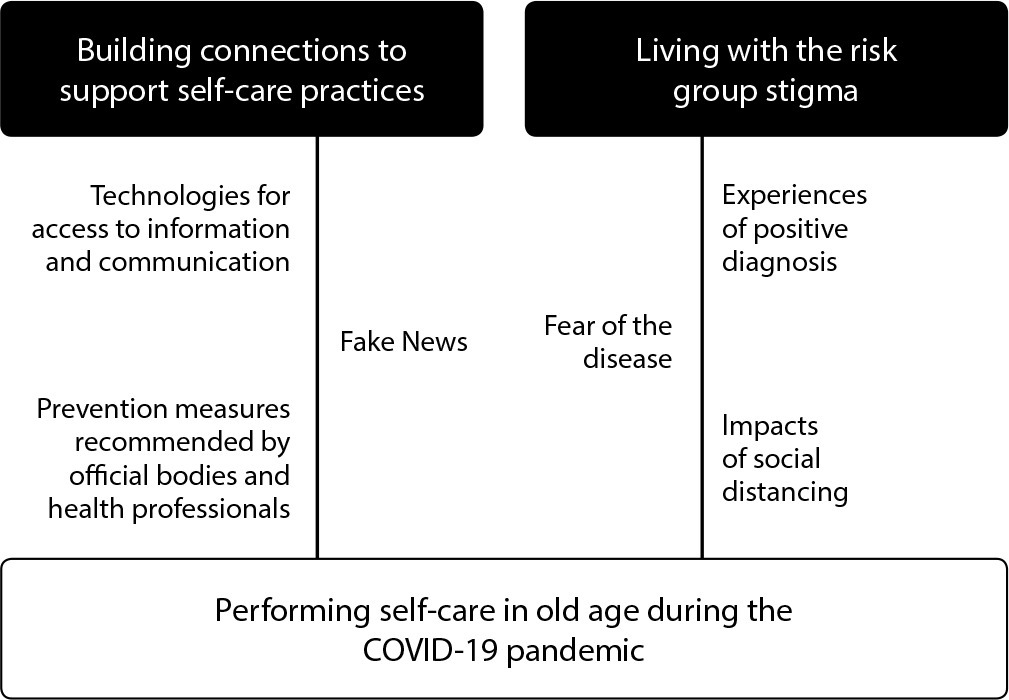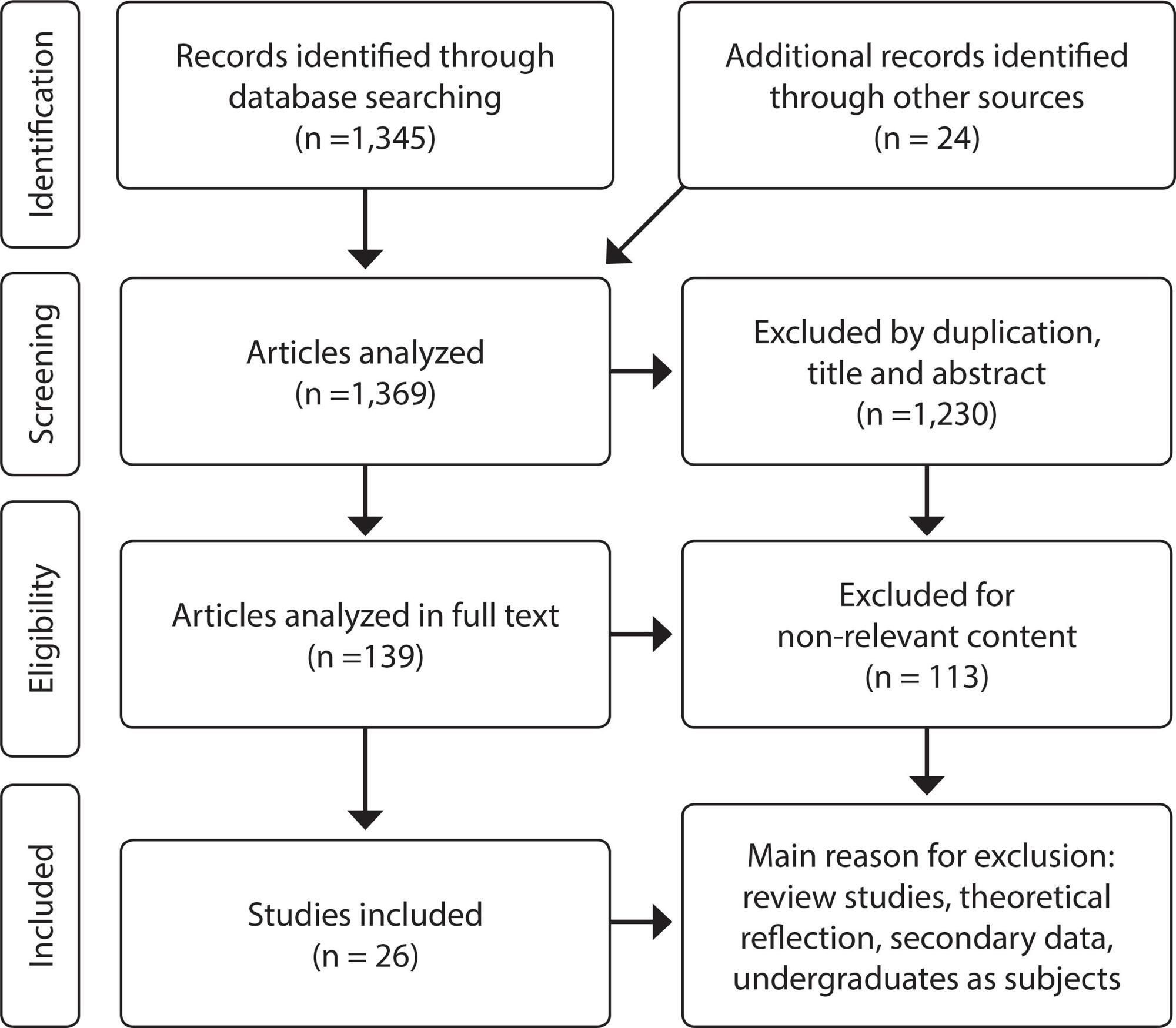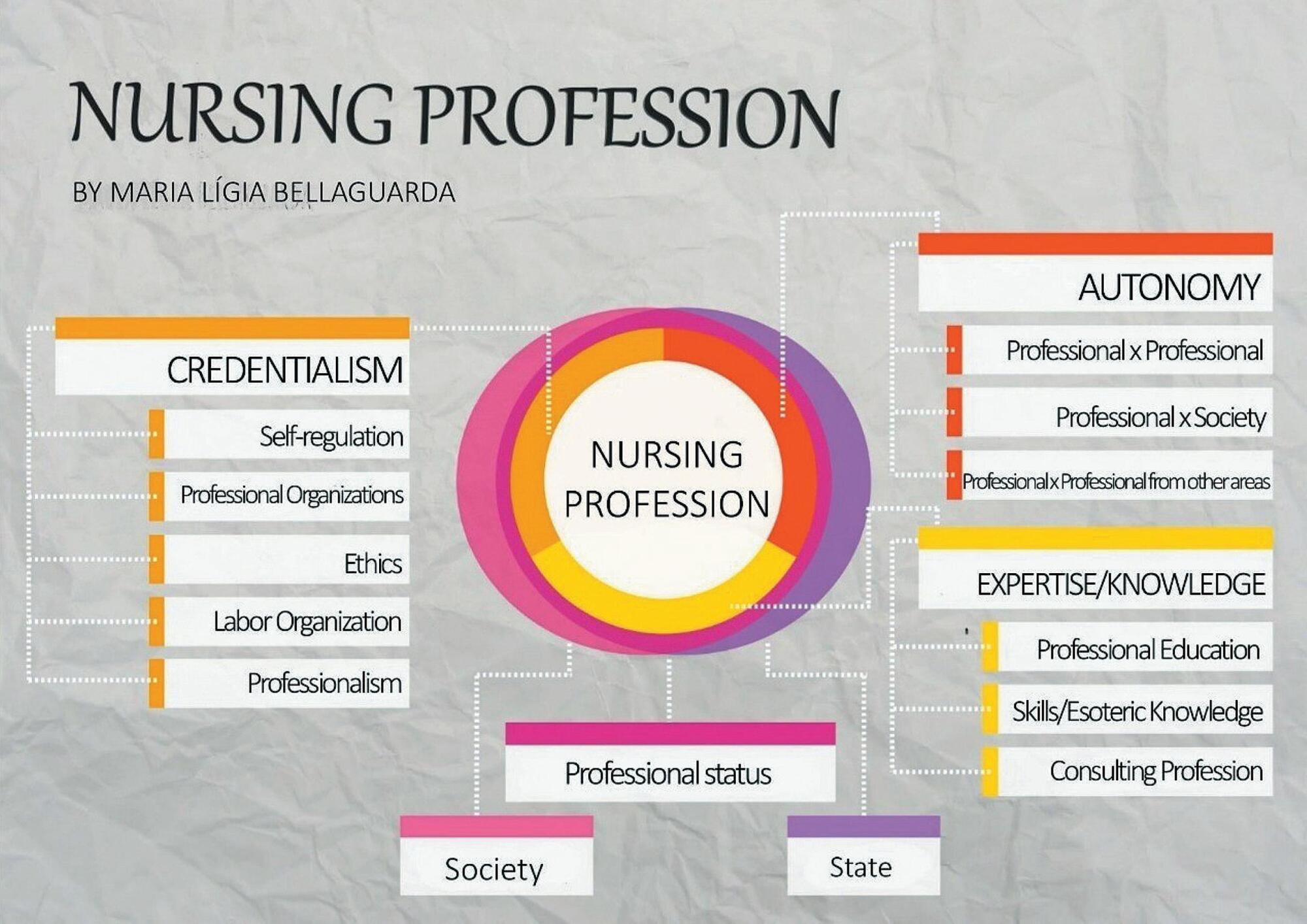-
ORIGINAL ARTICLE03-06-2023
Construct elaboration and validity of the Pregnancy Depression Risk Scale
Revista Brasileira de Enfermagem. 2023;76(2):e20220306
Abstract
ORIGINAL ARTICLEConstruct elaboration and validity of the Pregnancy Depression Risk Scale
Revista Brasileira de Enfermagem. 2023;76(2):e20220306
DOI 10.1590/0034-7167-2022-0306
Views0See moreABSTRACT
Objectives:
to elaborate and analyze the Pregnancy Depression Risk Scale psychometric properties.
Methods:
methodological research, in six steps: theoretical model empirical definition; elaboration of scale items with literature review; consultation with five professional health experts and 15 pregnant women; content validity with six experts; pre-test-semantic validity with 24 pregnant women; scale factor structure definition with 350 pregnant women; pilot study with 100 pregnant women, totaling 489 pregnant women and 11 experts. Data were analyzed by content analysis, exploratory factor analysis, multitrait-multimethod analysis and internal consistency.
Results:
sixty-eight risk factors were identified for item formulation. The final version of the scale consisted of 24 items in five domains. The scale demonstrated satisfactory construct content, semantic, validity and reliability.
Conclusions:
the scale proved to be valid in terms of content and semantics, with a factor structure defined according to the adopted theoretical model and satisfactory psychometric properties.
-
ORIGINAL ARTICLE03-06-2023
Medication reconciliation in pediatrics: a validation of instruments to prevent medication errors
Revista Brasileira de Enfermagem. 2023;76(2):e20210755
Abstract
ORIGINAL ARTICLEMedication reconciliation in pediatrics: a validation of instruments to prevent medication errors
Revista Brasileira de Enfermagem. 2023;76(2):e20210755
DOI 10.1590/0034-7167-2021-0755
Views0See moreABSTRACT
Objectives:
to develop and validate the content of two instruments for promoting medication reconciliation for the transition of care of hospitalized children.
Methods:
methodological study, conducted in five stages: scope review for conceptual structure; elaboration of the initial version; content validation with five specialists using the Delphi technique; reassessment; and construction of the final version of the instruments. A content validity index of at least 0.80 was adopted.
Results:
three rounds of evaluation were carried out to reach the validity index of the proposed contents, whereas a new analysis of 50% of the 20 items of the instrument aimed at families, and 28.5% of the 21 items aimed at professionals was necessary. The instrument aimed at families reached an index of 0.93, and the instrument for professionals, 0.90.
Conclusions:
the proposed instruments were validated. It is now possible to proceed with practical implementation studies to identify their influence on safety during medication reconciliation at transition of care.

-
REVIEW03-06-2023
Nursing protocols to reduce urinary tract infection caused by indwelling catheters: an integrative review
Revista Brasileira de Enfermagem. 2023;76(2):e20220067
Abstract
REVIEWNursing protocols to reduce urinary tract infection caused by indwelling catheters: an integrative review
Revista Brasileira de Enfermagem. 2023;76(2):e20220067
DOI 10.1590/0034-7167-2022-0067
Views0See moreABSTRACT
Objectives:
to analyze the production of knowledge in research articles about the effectiveness of nursing protocols for reducing indwelling urinary catheter dwell time and catheter-associated urinary tract infection rate in hospitalized adult and older patients.
Methods:
an integrative review of three full articles, available in the MEDLINE Complete – EBSCO, Scopus and Web of Science databases, from 01/01/2015 to 04/26/2021.
Results:
the three protocols reduced infection rates, and from the review/synthesis of their knowledge, a level IV body of evidence emerged to compose the nursing care process aimed at reducing indwelling urinary catheter dwell time and catheter-associated urinary tract infection.
Final Considerations:
this process gathers scientific evidence to support the elaboration of nursing protocols and, consequently, the conduction of clinical trials on its effectiveness in reducing urinary tract infection by indwelling urinary catheter.

-
ORIGINAL ARTICLE03-06-2023
Organizational politics and professional struggles in nursing
Revista Brasileira de Enfermagem. 2023;76(1):e20220180
Abstract
ORIGINAL ARTICLEOrganizational politics and professional struggles in nursing
Revista Brasileira de Enfermagem. 2023;76(1):e20220180
DOI 10.1590/0034-7167-2022-0180
Views0See moreABSTRACT
Objective:
to analyze the professional struggles between nursing organizational entities, in Rio de Janeiro, during the Regional Nursing Council’s electoral process (1990-1993 administration).
Method:
historical study. We used journalistic articles, normative documents, legislation and semi-structured interviews with five nursing professionals who participated in this process. Interpretation of findings was supported by Bourdieu’s concepts of habitus, field, capital, and symbolic power.
Results:
Electoral Code changes of the aforementioned council, under the influence of administration (1987-1990), candidate for re-election, influenced the disclosure and eligibility criteria, making it difficult for broad participation, especially of Associação Brasileira de Enfermagem Rio de Janeiro Section.
Final considerations:
nursing, in this period, generated a field of disputes related to positions of power and gender, which was evidenced in the electoral process studied, which highlighted using limiting strategies by a group, making it difficult for the entire category to participate.
-
ORIGINAL ARTICLE03-06-2023
The pandemic changes daily life and ways of living: technosociality and user/families experiences
Revista Brasileira de Enfermagem. 2023;76:e20220177
Abstract
ORIGINAL ARTICLEThe pandemic changes daily life and ways of living: technosociality and user/families experiences
Revista Brasileira de Enfermagem. 2023;76:e20220177
DOI 10.1590/0034-7167-2022-0177
Views0See moreABSTRACT
Objectives:
understand the changes imposed by the COVID-19 pandemic in the daily lives of users of Primary Health Care and their families and its impact on self-care and health promotion.
Methods:
this is a holistic-qualitative multiple case study, based on the Comprehensive Sociology of Everyday Life, in which 61 users participated.
Results:
experiencing a new daily life in COVID-19 pandemic times, users express their feelings, adaptation to new habits and ways of living. Health technologies and virtual social networks stand out in helping with everyday tasks, in communicating with loved ones and health professionals, and in validating dubious information. Faith and spirituality arise in the face of uncertainty and suffering.
Final Considerations:
it is imperative to pay close attention to the changes in daily life caused by the COVID-19 pandemic, in order to offer care directed to the singular and collective needs.

-
ORIGINAL ARTICLE03-06-2023
The self-care process of community-dwelling older adults during the COVID-19 pandemic
Revista Brasileira de Enfermagem. 2023;76:e20220644
Abstract
ORIGINAL ARTICLEThe self-care process of community-dwelling older adults during the COVID-19 pandemic
Revista Brasileira de Enfermagem. 2023;76:e20220644
DOI 10.1590/0034-7167-2022-0644
Views0See moreABSTRACT
Objectives:
to understand the self-care process of community-dwelling older adults during the COVID-19 pandemic.
Methods:
this is an explanatory study with a qualitative approach based on the constructivist Grounded Theory, carried out with 18 community-dwelling older adults. Data collection took place through interviews and content was analyzed through initial and focused coding.
Results:
two categories were obtained: “Building connections to support self-care practices” and “Living with the risk group stigma”. From their interaction, the phenomenon “Performing self-care in old age during the COVID-19 pandemic” emerged.
Final Considerations:
it was possible to identify how older adults’ experiences curing the COVID-19 pandemic had repercussions on their self-care process, being influenced by factors such as information about the disease and the impacts of risk group stigmas.

-
03-06-2023
Palliative care strategies in the management of people with serious cases of COVID-19
Revista Brasileira de Enfermagem. 2023;76:e20220308
Abstract
Palliative care strategies in the management of people with serious cases of COVID-19
Revista Brasileira de Enfermagem. 2023;76:e20220308
DOI 10.1590/0034-7167-2022-0308
Views0See moreABSTRACT
Objectives:
to analyze the assistance strategies in palliative care developed in the COVID-19 pandemic for critically ill patients and their families.
Methods:
an integrative review carried out in August 2021 and updated in April 2022 in the Base de Dados de Enfermagem (BDENF), Cumulative Index to Nursing and Allied Health Literature (CINAHL), Medical Literature Analysis and Retrieval System Online (MEDLINE), US National Library of Medicine (PubMed), Web of Science databases, and presented in the PRISMA flowchart.
Results:
thirteen works were selected for reading and content analysis, from which emerged the two main themes that reflect the reality evidenced in this context: The sudden advent of COVID-19 with impacts on palliative care; and The strategies used in palliative care to mitigate these impacts.
Final Considerations:
palliative care is the best strategy for providing health care, used as a comfort to bring relief and comfort to patients and families.

-
02-06-2023
The challenge of university teaching in times of the COVID-19 pandemic
Revista Brasileira de Enfermagem. 2023;76(2):e760201
Abstract
The challenge of university teaching in times of the COVID-19 pandemic
Revista Brasileira de Enfermagem. 2023;76(2):e760201
DOI 10.1590/0034-7167.2023760201
Views0This planet’s history has been a long and sometimes tortuous one. To date, a total of five disappearances of life on Earth have been distinguished: the great oxidation; the Ordovician-Silurian extinction; the Devonian extinction; the Permian-Triassic extinction; the Triassic-Jurassic extinction; and the Cretaceous-Tertiary extinction. The causes? Very varied and diverse: anoxia phenomena in the marine […]See more
-
ORIGINAL ARTICLE03-07-2022
Critically ill COVID-19 patients: a sociodemographic and clinical profile and associations between variables and workload
Revista Brasileira de Enfermagem. 2022;75:e20210119
Abstract
ORIGINAL ARTICLECritically ill COVID-19 patients: a sociodemographic and clinical profile and associations between variables and workload
Revista Brasileira de Enfermagem. 2022;75:e20210119
DOI 10.1590/0034-7167-2021-0119
Views0See moreABSTRACT
Objective:
To identify the sociodemographic and clinical profile of COVID-19 patients; measure workload and make associations between clinical variables.
Methods:
Cross-sectional study with 150 adult COVID-19 patients in an intensive care unit (from March to June 2020). Data from the electronic medical record in the first 24 hours of hospitalization: gender, age, education, origin, comorbidities, invasive mechanical ventilation, prone maneuver, renal replacement therapy, pressure injury, Braden, Nursing Activities Score, diagnoses, and nursing care. Descriptive statistical analysis, associations between clinical variables and age group.
Results:
Male (55.3%); mean age, 59 years; hypertensive (57.3%); obese (50.6%); diabetic (34%); invasive mechanical ventilation (66.7%); pronated (20.6%); hemodialysis (15.3%); Nursing Activities Score average, 86%. Twenty-eight nursing diagnoses and 73 cares were found.
Conclusion:
Patients required highly complex support. There was a significant association between pressure injury and workload with the prone maneuver. Nursing diagnoses and care reflect the needs of critical patients.
-
ORIGINAL ARTICLE06-01-2020
Factors associated with occupational stress among nursing professionals in health services of medium complexity
Revista Brasileira de Enfermagem. 2020;73:e20180913
Abstract
ORIGINAL ARTICLEFactors associated with occupational stress among nursing professionals in health services of medium complexity
Revista Brasileira de Enfermagem. 2020;73:e20180913
DOI 10.1590/0034-7167-2018-0913
Views0See moreABSTRACT
Objective:
To analyze the factors associated with occupational stress among nursing workers in health services of medium complexity.
Methods:
Epidemiological, cross-sectional, exploratory study. A randomly selected sample of 126 nursing professionals from medium complexity services in three cities in the state of Bahia (Santo Antônio de Jesus, Feira de Santana and Itabuna) was investigated. Data were collected in 2011 and 2012. The demand-control model proposed by Karasek was used to assess occupational stress. Simultaneous analysis of occupational stressors was performed using Poisson regression with robust variance.
Results:
The prevalence of occupational stress among nursing professionals was 77%. Occupational stress was associated with the professional category of nursing technician (p=0.01).
Conclusion:
The data indicates a concerning situation of exposure to occupational stressors, which requires coping strategies in order to protect the health of the worker.
-
REVIEW07-06-2020
Patient safety challenges in primary health care: a scoping review
Revista Brasileira de Enfermagem. 2020;73(5):e20190209
Abstract
REVIEWPatient safety challenges in primary health care: a scoping review
Revista Brasileira de Enfermagem. 2020;73(5):e20190209
DOI 10.1590/0034-7167-2019-0209
Views1See moreABSTRACT
Objectives:
to identify the patient safety challenges described by health professionals in Primary Health Care.
Methods:
a scoping review was conducted on the LILACS, MEDLINE, IBECS, BDENF, and CINAHL databases, and on the Cochrane, SciELO, Pubmed, and Web of Science libraries in January 2019. Original articles on patient safety in the context of Primary Health Care by health professionals were included.
Results:
the review included 26 studies published between 2002 and 2019. Four categories resulted from the analysis: challenges of health professionals, administration challenges of health services, challenges with the patient and family, and the potential enhancing resources for patient safety.
Conclusions:
patient safety challenges for Primary Care professionals are multiple and complex. This study provides insight into resources to improve patient safety for health care professionals, patients, administrators, policy makers, educators, and researchers.

-
ORIGINAL ARTICLE11-26-2022
Factors associated with suicide ideation of healthcare university students
Revista Brasileira de Enfermagem. 2022;75:e20200982
Abstract
ORIGINAL ARTICLEFactors associated with suicide ideation of healthcare university students
Revista Brasileira de Enfermagem. 2022;75:e20200982
DOI 10.1590/0034-7167-2020-0982
Views0See moreABSTRACT
Objectives:
to analyze the factors associated with suicidal ideation in students from healthcare graduation courses.
Methods:
quantitative, cross-sectional study, with 251 students from the courses of radiology, speech-language therapy, medicine, nutrition, health service management, and nursing, from a federal higher education institution in the Southeast of Brazil. Data were collected from August to October 2019, using an electronic questionnaire.
Results:
the prevalence of suicidal ideation among participants was 26.33%. In the final logistic regression model, only depressive symptoms were associated with suicidal ideation. Having symptoms of depression increased the chances of suicidal ideation 2.6 times.
Conclusion:
the high prevalence of suicidal ideation and its associated factors constitutes a situational diagnosis that demands the elaboration of public and institutional policies, focused on the promotion and attention to the mental health of the students.
-
REVIEW01-20-2021
Psychosocial factors in nursing work and occupational risks: a systematic review
Revista Brasileira de Enfermagem. 2021;74:e20200198
Abstract
REVIEWPsychosocial factors in nursing work and occupational risks: a systematic review
Revista Brasileira de Enfermagem. 2021;74:e20200198
DOI 10.1590/0034-7167-2020-0198
Views0See moreABSTRACT
Objective:
to identify, in international scientific production, the main psychosocial factors in nursing work, found through the Copenhagen Psychosocial Questionnaire (COPSOQ) application.
Methods:
a systematic review study of psychosocial factors at work among nursing professionals, who used COPSOQ in the assessment of work environments.
Results:
fifteen articles were identified, which highlighted as main psychosocial dimensions of nursing work demands, work organization, social relationships and leadership, work-home interface, workplace health and well-being and offensive behaviors.
Conclusion:
the high demands for cognitive, emotional work and work pace were identified in the nursing routine. Management support had a positive impact. Physical and psychological violence and shift work interfere in family life, aggravating the fatigue of these professionals. Interventions for reducing work stress presuppose the identification of psychosocial factors involved in nursing work.
-
ORIGINAL ARTICLE08-10-2020
Eliot Freidson’s sociology of professions: an interpretation for Health and Nursing
Revista Brasileira de Enfermagem. 2020;73(6):e20180950
Abstract
ORIGINAL ARTICLEEliot Freidson’s sociology of professions: an interpretation for Health and Nursing
Revista Brasileira de Enfermagem. 2020;73(6):e20180950
DOI 10.1590/0034-7167-2018-0950
Views0See moreABSTRACT
Objectives:
to analyze theoretical conceptions of Eliot Freidson’s Sociology of Professions scoped on health and nursing professions.
Methods:
Eight nurses were interviewed, all involved in the development of the professional Council on the timeframe from 1975 to 1986. Documental resources were Laws, Ordinances, Resolutions, Reports, Meeting Minutes and Public Deeds. Information was organized as from literature and Eliot Freidson’s conceptions, and thematic content analysis was carried out.
Results:
the concepts authored by Eliot Freidson allowed for the development of a concept chart that portrays the nursing profession and that may be expanded for the other occupations in the health field, in consonance with professional organization in the country.
Final Considerations:
Eliot Freidson’s framework, in interpretation for nursing, consolidates the profession with relative autonomy, expertise by Nursing Care Systematization and credentialism by professional normalizations.

-
07-16-2021
Sleep quality and its association with menopausal and climacteric symptoms
Revista Brasileira de Enfermagem. 2021;74:e20201150
Abstract
Sleep quality and its association with menopausal and climacteric symptoms
Revista Brasileira de Enfermagem. 2021;74:e20201150
DOI 10.1590/0034-7167-2020-1150
Views0See moreABSTRACT
Objective:
to assess sleep quality in menopausal women and its association with symptoms related to this period.
Method:
this is a cross-sectional, analytical and correlational study. Sleep was assessed using the Pittsburgh Sleep Quality Index; and climacteric symptoms, according to the Menopause Rating Scale. To compare the total score and each Menopause Rating Scale domain with the PSQI classification, the Mann-Whitney U non-parametric test was used. P<0.05 was considered significant.
Results:
261 women (67.8%) were classified as bad sleepers. There was a positive and significant correlation between the sleep scale scores and the total menopause score and its domains. Women categorized as poor sleepers had worse scores on the menopause symptom scale.
Conclusion:
women with worse sleep quality revealed greater severity of symptoms related to menopause.
-
ORIGINAL ARTICLE12-05-2019
Aging, sexuality and nursing care: the elderly woman’s look
Revista Brasileira de Enfermagem. 2019;72:71-78
Abstract
ORIGINAL ARTICLEAging, sexuality and nursing care: the elderly woman’s look
Revista Brasileira de Enfermagem. 2019;72:71-78
DOI 10.1590/0034-7167-2018-0015
Views0See moreABSTRACT
Objective:
to analyze the perception of elderly women about sexuality and practice of nursing care in this context.
Method:
a descriptive qualitative study. Fifty elderly women from Guanambi City – Bahia State were interviewed in 2016. Data collection technique was direct interview by using an unstructured script. Analysis of the semantic content described was carried out, and two empirical categories: the elderly woman’s view of nursing care in the promotion of sexual health and experience of sexuality in the elderly; and nursing care in the context of women’s aging.
Results:
it has been noted that the elderly women are afraid to talk about sexuality, especially with health professionals. By influences of society, they often exclude this issue of health care for elderly women.
Final considerations:
changes must be thought about assistance provided in relation to sexuality.
Search
Search in:
Nuvem de Tags
Adolescente (85) Atenção Primária à Saúde (239) COVID-19 (91) Criança (91) Cuidados de Enfermagem (269) Educação em Enfermagem (151) Educação em Saúde (139) Enfermagem (930) Enfermagem Pediátrica (86) Estudantes de Enfermagem (77) Estudos de Validação (131) Família (87) Idoso (208) Promoção da Saúde (99) Qualidade de Vida (104) Saúde do Trabalhador (86) Saúde Mental (145) Saúde Pública (82) Segurança do Paciente (150) Tecnologia Educacional (100)



